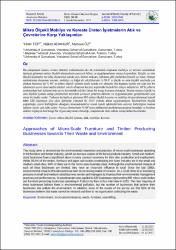Mikro Ölçekli Mobilya ve Kereste Üreten İşletmelerin Atık ve Çevrelerine Karşı Yaklaşımları
Access
Attribution 3.0 United Statesinfo:eu-repo/semantics/openAccesshttp://creativecommons.org/licenses/by/3.0/us/Date
2017Access
Attribution 3.0 United Statesinfo:eu-repo/semantics/openAccesshttp://creativecommons.org/licenses/by/3.0/us/Metadata
Show full item recordAbstract
Bu çalışmanın amacı, orman ürünleri endüstrisinin iki alt sektörünü oluşturan mobilya ve kereste sektöründe faaliyet gösteren mikro ölçekli işletmelerin çevresel bilinç ve uygulamalarını ortaya koymaktır. Küçük ve orta ölçekli işletmeler her ülke ekonomisi içinde sayı, üretim miktarı, istihdam gibi yönlerden önemli yer tutar. Orman endüstrisini oluşturan kereste, mobilya ve kâğıt alt sektörlerinin % 99,9' u küçük ve orta ölçekli sınıfında yer alırken bunların da % 96' sı mikro ölçekli işletme sınıfı içinde yer almıştır. Bu kapsam içinde yer alan her bir işletmenin çevre üzerindeki etkileri sınırlı olmasına karşın; toplamda önemli bir etkiye sahiptirler. 80'li yılların sonlarından beri işletmelerin çevre üzerindeki etkileri artan bir kaygı konusu olmuştur. Bunun sonucu küçük ve orta ölçekli işletme sahip-yöneticileri üzerinde çevresel yönetim aktivite ve uygulamalarını geliştirmeleri için artan bir baskı vardır. Trabzon da faaliyet gösteren 885 mikro ölçekli kereste ve mobilya üreten işletmeyi temsil eden 120 işletmeye yüz yüze görüşme yöntemi ile 2015 yılında anket uygulanmıştır. İşletmelerin büyük çoğunluğu, çevre kirliliğinin olduğuna inanmaktadırlar ancak kendi işletmelerinin çevreyi kirlettiğine inanan işletme sayısı çok daha azdır. Ayrıca işletmelerin % 66'sının atıklarının azaltılamayacağına inandığı ve üretilen atıkları toplayan her hangi bir organizasyonun olmadığı, araştırmada elde edilen sonuçlardan bazılarıdır. This study aims to demonstrate the environmental awareness and practices of micro-scale businesses operating in the furniture and timber industry, which are two sub-sectors of the forest products industry. Small and mediumsized businesses have a significant place in every country's economy for their size, production and employment. While 99.9% of the timber, furniture and paper sub-sectors constituting the forest industry are in the small and medium-sized class, 96% of them are in the micro-scale business class. Although the environmental impacts of each of these businesses are limited, they have an important influence in total. Since the late 1980s, environmental impacts of businesses have been an increasing matter of concern. As a result, there is an increasing pressure on small and medium-sized business owners and managers to improve their environmental management practices and performances. A questionnaire was applied to 120 businesses representing 885 micro-scale timber and furniture producing businesses operating in Trabzon by face to face interview in 2015. The clear majority of these businesses believe there is environmental pollution, but the number of businesses that believe their businesses less pollute the environment. In addition, some of the results of the survey are that 66% of the businesses believe that waste cannot be reduced and there is no organization collecting the waste.
Volume
19Issue
2Collections
The following license files are associated with this item:



















